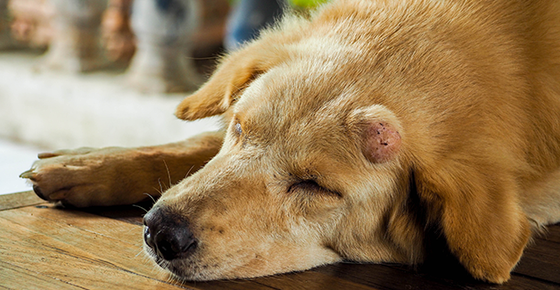
Family pets are often described as our "best friends" and news that they are sick can be devastating. Cancer is a disease that can affect family pets like dogs and cats. Through the years, research has developed many cures and treatments for use in improving or sustaining the health of pets that present with a cancer diagnosis.
Let's look at a few of the facts about cancer in family pets. What is it and what can you do about it? Cancer, or a tumor, is typically a mass of tissue that is abnormal. The mass, lump or growth develops when your pet's cells divide more rapidly than normal.
The mass may also develop because those cells do not die when they ordinarily would. Often we refer to a tumor as benign or malignant. A benign tumor does not spread and does not have the invasive abilities of a malignant tumor. Malignant tumors are known to invade surrounding tissue or set up housekeeping in other parts of your pet's body.
Cancer is a serious disease in dogs and cats. It is also common. In some areas, cancer is the top cause of death in family pets. Throughout the United States, about fifty-percent of pet dogs and cats lose their life to some form of cancer. The disease is often treatable with surgery, radiation therapy or chemotherapy.
Many pets will do well with surgery to remove the tumor or mass of cancerous cells. Depending on the involved organs and location of the unwelcome cells, surgery may be enough. Veterinarians can recommend that radiation therapy be performed before surgery to shrink the tumor.
Your vet may suggest that chemotherapy should be received by your pet in conjunction with, or independent of, surgery or radiation. Only your veterinarian can recommend the best course of action to treat your pet's cancer.
Various indicators will lead your veterinarian in making the diagnosis, developing a treatment plan acceptable to you and your pet and performing the necessary treatment.
The Animal Cancer Center at Colorado State University has identified specific information for dog and cat owners about the frequency of cancer and advises pet owners that:
- Not all cancers are the same. Depending on the location and biologic behavior, there may be several treatment options available.
- Cancer is the leading cause of death in pet cats and dogs in the United States. As many as 50% of pets die of cancer.
- An estimated 6,000,000 dogs and nearly 6,000,000 cats will be diagnosed with cancer this year. In many of these animals, the malignancy will look and behave much as it would in humans, such as spreading to the same organs.
- Cancer is the leading cause of death in 47% of dogs, especially dogs over age 10, and 32% of cats. Dogs get cancer at about the same rate as humans, while cats get fewer cancers. In most cases it's a disease found in aging animals.
- There are nearly 100 types of animal cancer. Most common in cats is leukemia, while the most common cancers for dogs are lymphoma and mammary gland cancer.
- Many of the same treatments that are available for humans are now available for pets. These treatments include chemotherapy, radiation therapy and surgery.
Know the facts and discuss them completely with your veterinarian during development of a treatment plan. Your pet is depending on you and the treatment plan you will create with your veterinarian.
